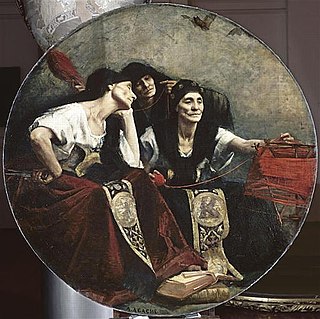 W
WIn ancient Greek religion, Ananke, from the common noun ἀνάγκη, "force, constraint, necessity") is the personification of inevitability, compulsion and necessity. She is customarily depicted as holding a spindle. One of the Greek primordial deities, the births of Ananke and her brother and consort, Chronos were thought to mark the division between the eon of Chaos and the beginning of the cosmos. Ananke is considered the most powerful dictator of fate and circumstance; mortals as well as gods respected her power and paid her homage. Sometimes considered the mother of the Fates, she is thought to be the only being to influence their decisions. According to Schowalter and Friesen, she and the Fates "are all sufficiently tied to early Greek mythology to make their Greek origins likely."
 W
WIn sha'Allah, also spelled In shaa Allah, is an Arabic language expression meaning "if God wills" or "God willing". The phrase is commonly used by Muslims and Arabic-speakers of other religions to refer to events that one hopes will happen in the future. It expresses the belief that nothing happens unless God wills it and that his will supersedes all human will. The phrase can take on an ironic context, implying that something will never happen and is left to God's hands, or can be used as a gentle way of declining invitations.
 W
WIn ancient Greek religion and mythology, the Moirai, often known in English as the Fates, were the incarnations of destiny; their Roman equivalent was the Parcae, and there are other equivalents in cultures that descend from the Proto-Indo-European culture. Their number became fixed at three: Clotho ("spinner"), Lachesis ("allotter") and Atropos.
 W
WIn ancient Roman religion and myth, the Parcae were the female personifications of destiny who directed the lives of humans and gods. They are often called the Fates in English, and their Greek equivalent were the Moirai.
 W
WPredestination, in Christian theology, is the doctrine that all events have been willed by God, usually with reference to the eventual fate of the individual soul. Explanations of predestination often seek to address the "paradox of free will", whereby God's omniscience seems incompatible with human free will. In this usage, predestination can be regarded as a form of religious determinism; and usually predeterminism, also known as theological determinism.
 W
WShikata ga nai , pronounced [ɕi̥kata ɡa naꜜi], is a Japanese language phrase meaning "it cannot be helped" or "nothing can be done about it". Shō ga nai (しょうがない), pronounced [ɕoː ɡa naꜜi] is an alternative.
 W
WSic transit gloria mundi is a Latin phrase that means "Thus passes worldly glory".
 W
WThe Ursitory are a group of three fairies or female spirits of fate in Romani folklore. Two of them are good spirits, while one tries to harm people. Their queen is Matuya, who makes use of gigantic birds called the Charana.
 W
WWyrd is a concept in Anglo-Saxon culture roughly corresponding to fate or personal destiny. The word is ancestral to Modern English weird, which retains its original meaning only dialectically.